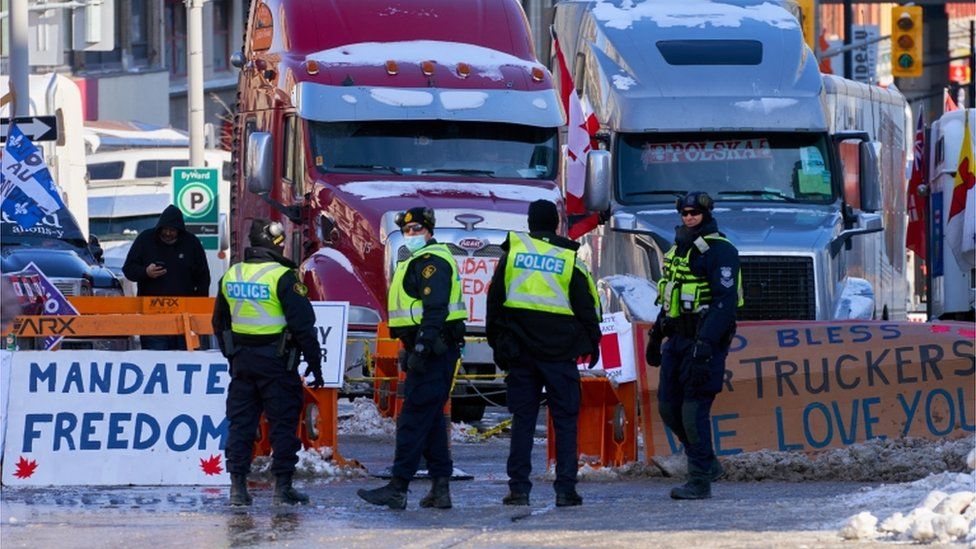 A Canadian financial institution has struck another blow against the attempts by the convoy group blockading Ottawa to collect on the millions of dollars it has solicited in online donations.
A Canadian financial institution has struck another blow against the attempts by the convoy group blockading Ottawa to collect on the millions of dollars it has solicited in online donations.
On Friday, TD Bank told CTV News that it would apply to surrender to an Ontario court the money that had not been refunded by GoFundMe, totaling about $1 million, as well as some $400,000 the group had accepted through direct donations. “TD has asked the court to accept the funds, which were raised through crowdfunding and deposited into personal accounts at TD, so they may be managed and distributed in accordance with the intentions of the donors, and/or to be returned to the donors who have requested refunds but whose entitlement to a refund cannot be determined by TD,” spokesperson Carla Hindman said.
Convoy lawyer Keith Wilson said that the group planned to fight to retrieve any money they had raised and could be seen in a video promoting the group’s next play: a cryptocurrency fundraiser that has raised almost US$1 million.
“We will be taking expedited legal steps to have the restrictions on the donated funds lifted as soon as possible,” Wilson said in an email to CTV News.
It’s another hurdle in collecting any donations for the convoy, which has occupied Ottawa for about two weeks and blocked other border crossings as a protest of vaccine mandates. The ongoing protest prompted Ontario Premier Doug Ford to declare a provincial state of emergency Friday.
Of the more than $10 million raised by crowdfunding platform GoFundMe, only $1 million was deposited, before GoFundMe opted to return the remainder of the funds.
A second set of fundraisers, set up on GiveSendGo, has reached almost $9 million as of Friday.
But late Thursday, the Ontario Superior Court froze funds coming from those accounts, after an application from the province’s Attorney-General that alleged the funds would further a criminal act: mischief on the streets of Ottawa. GiveSendGo has said the order does not apply to it and is still raising the funds.
In a video posted on Facebook by supporters, convoy organizers discuss the strategy online for fundraising, turning to a crowdfunding website that has raised $913,000 as of Friday afternoon, in satoshis, which each represent a 100 millionth fraction of a bitcoin.
“The principle philosophy of what Bitcoin is is freedom,” one says. “For everyone who had their voice stolen by “GoFraudMe”, “GoFundMe,” you should feel solace that there are now alternatives.”
According to documents filed in an Ontario court, the Ottawa Police were watching that video too. In their affidavit, an officer referenced the convoy’s cryptocurrency fundraising strategy, but authorities didn’t apply to freeze any of it.
The digital currency is decentralized, say experts, so it is difficult to regulate. This crowdfunding approach may become the norm, Erica Pimentel of Queens University said.
“I think Bitcoin is going to become the currency of social movements. And they are going to be playing international whack-a-mole trying to stand in the way of those transactions,” Pimentel said.
James Cohen of Transparency International Canada said the widely publicized use of cryptocurrency to fund what authorities have deemed an illegal act could be the catalyst for more transparency in how groups fundraise internationally.
“This isn’t new. The warning signs have been up well before this event,” he said. “This situation kind of amplifies things as all Canadians are witnessing the effects of anonymous money in real time, so there’s more momentum to do things.”
Cohen said any international money or cryptocurrency will become subject to Canadian rules as soon as someone attempts to convert it to legal tender to buy things protesters have been spending money on, including gasoline.
“They can say Canada doesn’t have jurisdiction, but the second it touches a Canadian financial institution it does have jurisdiction,” he said.



